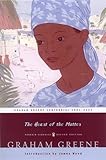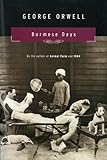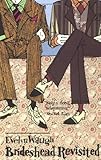 I have a slightly hard time with Graham Greene. I don’t know why. I think his writing is very good. He has weighty themes and sexy titles. And yet I have found that I can’t really remember anything about his novels beyond the most basic plot points. I’m talking about his “serious” fiction here. I could tell you the story of Travels With my Aunt in painful detail, but recalling The Power and the Glory, I can only come up with “The priest died.” I also read The Quiet American; in that one I remember the American died. A pattern emerged in The Heart of the Matter, wherein the policeman was also called to Graham Greene’s crowded firmament.
I have a slightly hard time with Graham Greene. I don’t know why. I think his writing is very good. He has weighty themes and sexy titles. And yet I have found that I can’t really remember anything about his novels beyond the most basic plot points. I’m talking about his “serious” fiction here. I could tell you the story of Travels With my Aunt in painful detail, but recalling The Power and the Glory, I can only come up with “The priest died.” I also read The Quiet American; in that one I remember the American died. A pattern emerged in The Heart of the Matter, wherein the policeman was also called to Graham Greene’s crowded firmament.
 The Heart of the Matter might turn out to be more memorable for me because it is about unsavory colonials (Although I suppose The P & G and The QA are also about unsavory colonials, in their own ways. I guess most things are about unsavory colonials, when you get right down to it). But I was more receptive to The Heart of the Matter because it reminded me of one of my favorite books, Burmese Days, George Orwell’s first novel and what I consider to be his unsung masterpiece. Burmese Days, like The Heart of the Matter, is about unsavory colonials, and it is about suicide. Both novels are populated with pathetic, overgrown schoolboys and refined women living for their husbands’ promotions; in both you feel what a shoddy business colonialism is. Although I prefer Burmese Days and its overall effect, Greene’s description of the bachelor cable censor and the bachelor spy (both graduates of the same second-rate school) competing at cockroach-hunting in the decrepit Bedford Hotel is a great moment in literature, and in the history of Empire.
The Heart of the Matter might turn out to be more memorable for me because it is about unsavory colonials (Although I suppose The P & G and The QA are also about unsavory colonials, in their own ways. I guess most things are about unsavory colonials, when you get right down to it). But I was more receptive to The Heart of the Matter because it reminded me of one of my favorite books, Burmese Days, George Orwell’s first novel and what I consider to be his unsung masterpiece. Burmese Days, like The Heart of the Matter, is about unsavory colonials, and it is about suicide. Both novels are populated with pathetic, overgrown schoolboys and refined women living for their husbands’ promotions; in both you feel what a shoddy business colonialism is. Although I prefer Burmese Days and its overall effect, Greene’s description of the bachelor cable censor and the bachelor spy (both graduates of the same second-rate school) competing at cockroach-hunting in the decrepit Bedford Hotel is a great moment in literature, and in the history of Empire.
The novels share a handful of other elements. (Let me to take a moment to apologize if my penchant for well-trod literary territory and retrograde comparey-contrasty analysis revolts readers, lowers the general tone, and threatens to turn this site into a high school English class, as one truculent darling recently noted in a thrilling commenter skirmish. Like Elvis, I’m just doin’ [sic] the best I can.) At any rate, both of these novels have: 1. A rich, conniving Native, the baseness of whose mind is rather cheaply reflected in the grossness of his person. 2. A comparatively fetching young English woman, marooned in an undesirable outpost of empire. 3. A small, grumpy, racist English population, whose primary concern is the eternal struggle to keep the gin cold. 4. And, by christ, they’ve both got a main character whose surname is five letters and ends in a y!
Perhaps these similarities have to do with the universality of the colonial (and, dare I say, the post-colonial) experience and mentality. And maybe Graham Greene had a gander at Orwell’s earlier novel and used it as a jumping-off point for his more complex and (to me) less convincing story. Because ultimately the novels diverge, and The Heart of the Matter goes in a puzzling direction.
Both novels end in a suicide. I understand the motivations of Orwell’s wretched Flory, whose public disgrace, as a casualty of local political machinations, prevents him from marrying the (awful) woman of his dreams. Love hurts. And life, especially his, sucks. But Greene’s Scoby, who is also a suicide and also in some respects a victim of local politics, is harder to empathize with. Scoby is a converted Catholic and a real boy scout. His official career is undistinguished, despite his devotion to his various duties. His young daughter has died. His wife is a trial but he tries to make her happy. She remains unhappy, and goes to live in South Africa, and through a series of extraordinary events, Scoby is unfaithful. The wife comes back, and then he is unfaithful to his mistress with the wife. He feels awfully guilty, but he takes Communion anyway which is a mortal sin, and then he’s so distraught by this that he ends it all. Meanwhile, he finally gets that promotion. His life sucked too, maybe more than Flory’s, but he seemed okay with it for the most part. It was the sinning that finally got him down.
 I read Brideshead Revisited, where I learned that British Catholics are an obscurely persecuted minority who have to Stick Together No Matter What. I am also familiar with the adage about the converted and his alarming zeal. But still it seemed odd to me that Scoby committed one easily forgiven sin, and then made it worse by taking Communion, and then decided to do the one thing that is basically unfixable in his cosmology, which is to leave the party early and on purpose. It was clear that Scoby was bound for a sad end, but I thought it would be from borrowing money, or for not being whatever the word for “pukka” is in West Africa, or for some terrible scandal with his job. But no, it’s all got to do with his immortal soul. I suppose I am very privileged in that, if I am in possession of an immortal soul, it gives me very little trouble, like an unerupted wisdom tooth.
I read Brideshead Revisited, where I learned that British Catholics are an obscurely persecuted minority who have to Stick Together No Matter What. I am also familiar with the adage about the converted and his alarming zeal. But still it seemed odd to me that Scoby committed one easily forgiven sin, and then made it worse by taking Communion, and then decided to do the one thing that is basically unfixable in his cosmology, which is to leave the party early and on purpose. It was clear that Scoby was bound for a sad end, but I thought it would be from borrowing money, or for not being whatever the word for “pukka” is in West Africa, or for some terrible scandal with his job. But no, it’s all got to do with his immortal soul. I suppose I am very privileged in that, if I am in possession of an immortal soul, it gives me very little trouble, like an unerupted wisdom tooth.
And I wasn’t quite sure what Graham Greene made of this behavior either – whether he presented this character as exemplary of an excess of virtue, or of Catholics being crazy, or whether he thought Scoby was a saint or an idiot or what. He’s certainly the nicest person in the book. Maybe it isn’t something easily categorized. Maybe it is, to use the abhorrent popular expression, what it is.
For a while I thought that Greene’s novel was the less depressing one, because it dealt with somebody who is not like most people, instead of, as in Orwell’s novel, with a a pretty ordinary man in an unfortunate spot. I venture to say that most people don’t kill themselves because they’ve told two women they love them and then go to church, as Scoby does. I was going to say that Orwell’s novel is more rugged and brutal than Greene’s, without any of this airy-fairy spiritual stuff, but the more I think about it, the less I know (and the more confused I get). Most functioning organisms will almost always believe that life is better than death, but something about Scoby’s psyche was obviously incompatible with life, even though he seemed like such a nice guy. I wanted to shake Scoby and say “Snap out of it, Scoby! You have every reason to live!” but even without the compromised immortal soul aspect, he really didn’t really have a lot of good reasons to live.
Both Burmese Days and The Heart of the Matter seem to say that life, or life in a certain place, is kind of rubbish, but Greene takes it further to say that the most, I guess principled person, in the place isn’t able to live in it. That, maybe, is the heart of the matter. And that’s dark.








